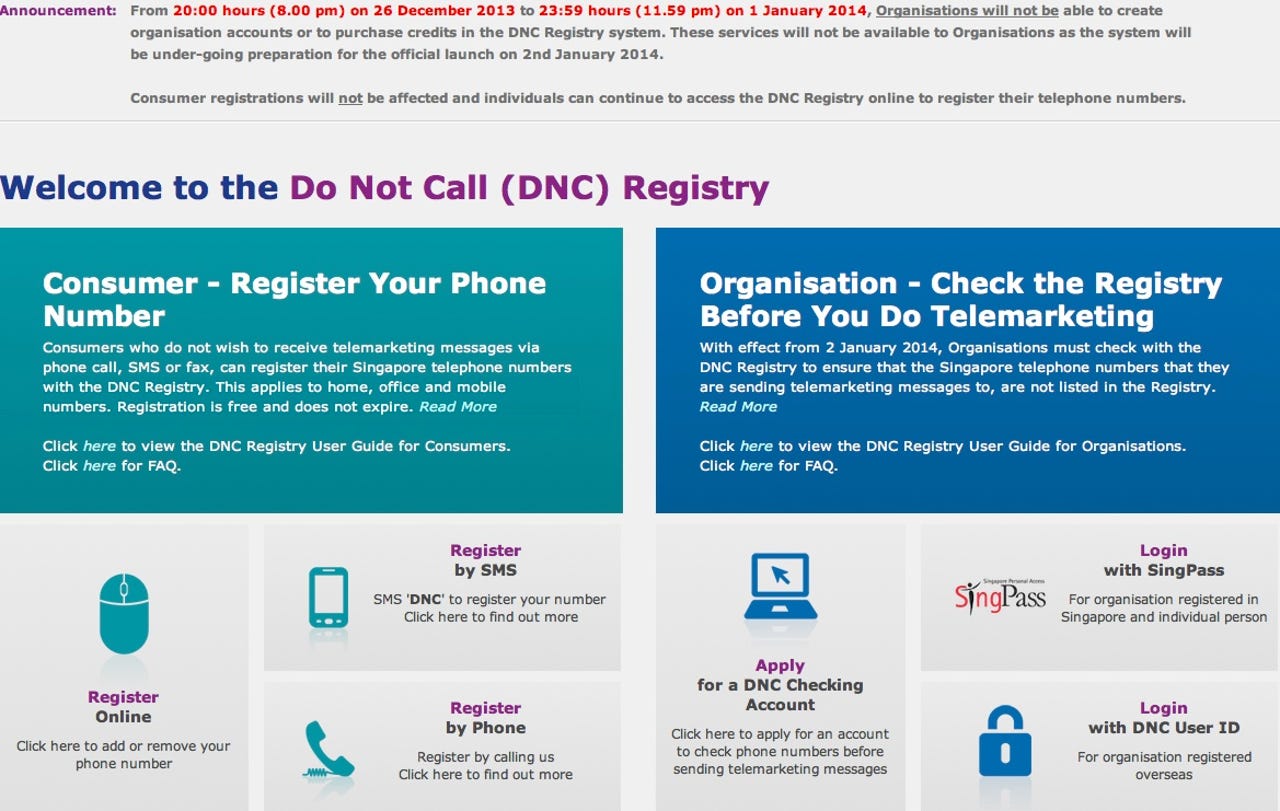Singapore adds Do-Not-Call 'exemption' for firms with existing customers


[UPDATE] Businesses in Singapore can now continue to send text or fax messages to existing customers without having to first check with the Do-Not-Call (DNC) Registry when this list comes into effect January 2.
The Personal Data Protection Commission (PDPC) on Thursday introduced a new "exemption order" that allows organizations to send text and fax messages on related products and services to customers with whom they have an ongoing relationship, without having to check if these customers had registered with the DNC.
Read this
A key feature in the country's Personal Data Protection Act, the DNC Registry contains the list of Singapore consumers who have opted out from spam advertisement messages and telemarketing calls. Organizations will need to check and confirm the telephone number is not listed in the registry before they can use the number for telemarketing purposes. While the DNC registry comes into effect on January 2, 2014, companies will have 60 days to ensure compliance during the first six months after the registry's operations, and 30 days thereafter.
To date, over 350,000 unique phone numbers have been registered with the registry, a spokesperson from the Personal Data Protection Commission told ZDNet.
In a statement issued on behalf of the PDPC, Singapore's ICT regulator Infocomm Development Authority (IDA) said the new exemption order does not apply to voice calls, so businesses will still need to check with the DNC registry before embarking on any telemarketing calls.
It explained that the exemption was introduced in recognition of customers who may wish to continue receiving information, via text or fax, from businesses with which they have an ongoing relationship, even though they have registered with the DNC. A bank or credit card company, for instance, can continue to send its existing credit-card holders telemarketing messages about related services, such as a rewards schemes for its credit-card customers.
Despite the exemption order, businesses are still required to include instructions in their text and fax messages on how consumers can opt out of future messages as well as enable them to do so using the same medium on which the messages is received.
Upon the customer's opt-out request, the organization must stop sending such messages within 30 days of receiving the request. If the companies fail to do so, customers should approach the organization and instruct to have their numbers removed. Failing which, they can lodge a complaint with the PDPC for further investigations, the PDPC spokesperson said.
"Note that organizations that do not provide or respect an opt-out facility as required by the exemption order must check the DNC Registry or obtain clear consent before sending telemarketing messages to individuals. Failure to do so would constitute a breach of Section 43 of the Personal Data Protection Act," he told ZDNet.
Noting that the exemption order applies to businesses with ongoing relationship with the customer, he said a one-off transaction will not be considered as an existing relationship.
"The exemption order provides greater flexibility for organizations to serve their customers in a minimally intrusive manner, and the DNC Registry advisory guidelines aim to help them along with respect to telemarketing," said Leong Keng Thai, chairman of PDPC, who is also IDA's deputy chief executive and director-general of telecoms and post.
The PDPC also released additional advisory guidelines, including details of the exemption order and examples of how the DNC provisions apply in different scenarios. The advisory encompasses how businesses should obtain consent for telemarketing, and outlines what information telemarketing messages must include such as identification and contact details.
According to stats from the IDA, Singapore's mobile penetration rate last year was 151.8 percent, while 3G subscriptions clocked at almost 5.54 million in the third quarter of 2013.